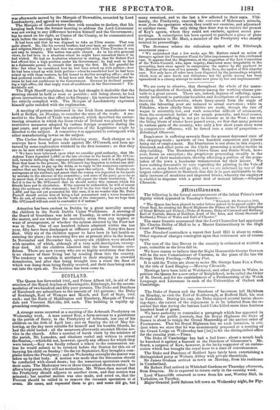SCOTLAND.
The Queen has forwarded 1001., and Prince Albert 501., in aid of the erection of the Royal Asylum at Morningside, Edinburgh, for the accom- modation of two hundred and fifty poor persons. The Duke and Dutchess of Buccleuch are subscribers to the amount of 125 guineas ; the Duke of Roxburgh, Earl of Wemyss and March, and Earl of Stair, 1001. each; and the Earls of Haddington and Rosebery, Marquis of Tweed- dale and Viscount Melville, 50/. each. The building is rapidly ap preaching completion.
A strange scene occurred at a meeting of the Arbroath Presbytery on Wednesday week. A man named Key, a farm-servant to a gentleman in the parish of Barry, in the Presbytery of Arbroath, lost one of his children on the 30th of April last ; and on Sunday the 2d of May fol- lowing, as the day most suitable for himself and his humble friends, he had the child buried : all the mourners afterwards attended Divine ser- vice in the church. After a number of harsh visits by the-minister of the parish, Mr. Lumsden, and citations verbal and written to attend the Session,—whichdid not, however, specify any offence for which they were issued,—Key was finally refused a token to the communion un- less he would submit to be rebuked before the Session for this sin of burying his child on Sunday On theist September, Bey brought a com- plaint before the Presbytery ; and on Wednesday sennight the matter was taken up by that body. A motion was made that the discussion should be conducted with closed doors ; but the numerous spectators stuck to their seats. The Moderator two or three times asked them to retire ; but after a long pause, they still sat motionless. Mr. Wilson then moved that the Presbytery should adjourn to another room, and that motion was minuted; but another motion was also made, and acted on, that the Provost should be called in to remove the recusant spectators vi et ands. He came, and requested them to go; and some did go, but many remained, and to the last a few adhered to their seats. Ulti- mately, the Presbytery, enacting the converse of Mahomet's miracle, went from the spectators whom they could not exorcise, and adjourned to another room. The only thing then done was to receive the protest of Key's agents, whom they could not exclude, against secret pro- ceedings. A subscription has been opened to purchase a piece of plate for presentation to Mr. Muir, a member of the Presbytery who stoutly resisted its proceedings.
The Scotsman' relates the ridiculous upshot of the Edinburgh sweetmeat case- " We understand that a few weeks ago Mr. Butters raised an action of damages against the Procurator-Fiscal for false imptisonment in this celebrated case. It appears that the Magistrates, at the suggestion of the Law Committee of the Town-Council, who, upon inquiry, discovered some irregularity in the proceeding, have since agreed to compromise the matter by the payment to Mr. Butters of the sum of ten pounds. Mark, then, the upshot of this singular case. Not only have all sober men been disgusted by the proceedings adopted, which were at once harsh and ridiculous, but the public money has been squandered in a clumsy attempt to make men pious by fine and imprisonment.'
We are sorry to observe, that throughout the whole of the manu- facturing-districts of Scotland, distress among the working-classes pre- vails to a great extent. There are, indeed, degrees of suffering, appa- rently incidental to particular localities and descriptions of goods manu- factured. In Renfrewshire, where fancy-goods form the staple of trade, the labouring poor are reduced to actual starvation ; while in Fifeshire, where chiefly linen fabrics are made, though the rate of wages is miserably low, and work somewhat difficult of attainment, from the economical habits of the people generally, and local causes, the degree of suffering is not yet so intense as in the West ; but ere the biting blasts of winter have passed away, we fear that many persons in various parts of the country, who only a few short years since were in comparative affluence, will be forced into a state of pauperism.— Edinburgh Observer.
Dumbarton is suffering severely from the present depressed state of the shipping-trade ; upwards of two hundred carpenters and joiners being out of employment. But Dumbarton is not alone in this respect ; Greenock and other ports on the Clyde presenting a similar decline in ship-building. The Dumbarton Crown Glass and Bottle-Work, how- ever, forms an exception ; the proprietors proceeding steadily in the increase of their manufacture, thereby affording a portion of the popu- lation of the town a handsome remuneration for their labour. We have nothing favourable to note regarding the printing in the Vale of Leven, as many hands still go idle ; and we arc informed by one of the largest calico-printers in Scotland, that this is in part attributable to the daily increase of machines and improved blocks, whereby the employer is enabled to dispense with a great deal of manual labour.—Glasgow Chronicle.


























 Previous page
Previous page